
At ten in the morning, D-Day, the LCIs (Landing Craft, Infantry) containing the 1st and 3rd Battalions, 359th Regiment, and the 915th Field Artillery Battalion (Group A), began to release their troops to smaller boats for the 90th's initial landings on enemy-held soil.
The Engineers had cleared a ten-foot passage through the water, too narrow a passage for the LCIs. Mines, wire, I-beams and constant shelling were the hazards to be hurdled, but the landing boats threaded safely through. As the boats approached the shore the troops leaped into the hip-deep water with weapons held high overhead, raced across the artillery-churned sands of Utah-Beach, past the burning vehicles caught in previous barrages, and found momentary protection at a seawall 400 yards distant.
The beach was constantly shelled, and inevitable casualties were suffered. Pfc. David F. Atcuson (Private First Class) was the first to fall, the first among many in the 90th to give his life. At four in the afternoon the disembarking of Group A was completed.
Still attached to the 4th Infantry Division, the two battalions moved immediately to an assembly area near Saint-Martin-de-Varreville, approximately two kilometers west of the beach. That same evening, Pfc. Samuel C. Maples, outposting the assembly area, detected elements of an enemy patrol and fired his BAR (Browning Automatic Rifle). Two Germans were killed, one wounded, and one taken prisoner. And so the 90th Division for the first time drew blood.
Meanwhile, on D-Day, the remainder of the 90th Division set sail for France, utilizing four transports for the movement : the Susan B. Anthony, the Excelsior, the Explorer, and the Beinville. The following morning, the Susan B. Anthony, standing off Utah-Beach, struck a mine and sank within two hours.
The sinking ship, transporting the Division's advance detachment and the 359th Regiment (minus Group A) was quickly abandoned without loss of life, and its troops assembled in the vicinity of Reuville, about five kilometers inland. Only individual equipment was salvaged, from the doomed vessel, and for days thereafter the 2nd Battalion of the 359th found it necessary to resort to improvisation to supplement its inadequate arms.